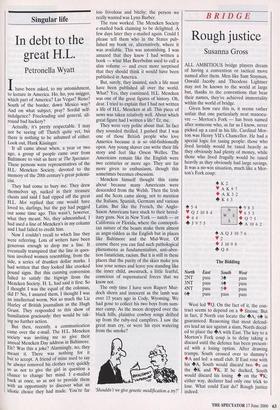Singular life
In debt to the great H.L.
Petronella Wyatt
Ihave been asked, to my astonishment, to lecture in America. Ho, ho, you snigger, which part of America? Las Vegas? Reno? South of the border, down Mexico way? And on what subject, pray? Sordid self- indulgence? Freeloading and general, all- round bad hackery? Actually, it's pretty respectable. I may not be seeing off Thatch quite yet, but there is nothing to be ashamed of either. Look out, Hank Kissinger. It all came about when, a year or two ago, a group of people came over from Baltimore to visit us here at The Spectator. These persons were representatives of the H.L. Mencken Society, devoted to the memory of the 20th century's great polemi- cist.
They had come to bury me. They drew themselves up, sucked in their treasure chests and said I had ripped off the great H.L. Moi replied that one would have loved to, darlings, but the guy had pegged out some time ago. This wasn't, however, what they meant. No, they admonished, I had used a line of Mencken's in my column and I had failed to credit him.
Now I couldn't recall to which line they were referring. Lots of writers have been generous enough to drop me a line. It eventually transpired that the line in ques- tion involved women resembling, from the side, a series of drunken dollar marks. I had written that they looked like crooked pound signs. But this cunning conversion failed to satisfy the bigwigs from the Mencken Society. H. L. had said it first. So I thought I was the equal of the colossus, did I? No, I assured them, I thought I was an intellectual worm. Not so much the Liz Hurley of British journalism as the Hugh Grant. They responded to this show of humiliation graciously: they would be tak- ing no further action. But then, recently, a communication came over the e-mail. The H.L. Mencken soeie.—ty was inviting me to give their annual Mencken Day address in Baltimore. Eh? Was this a joke? Alarmingly, no, they meant it. There was nothing for it but to accept. A friend of mine used to say he always removed his clothes very quickly so as not to give the girl in question a chance to change her mind. I e-mailed back at once, so as not to provide them With an opportunity to discover what an idiotic choice they had made. You're far too frivolous and bitchy; the person we really wanted was Lynn Barber.
The ruse worked. The Mencken Society e-mailed back claiming to be delighted. A few days later they e-mailed again. Could I please tell them who in the States pub- lished my book or, alternatively, where it was available. This was astonishing. I was amazed that they knew I had written a book — what Max Beerbohm used to call a slim volume — and even more surprised that they should think it would have been published in America.
But, surely, they insisted, such a life must have been published all over the world. What? Yes, they continued, H.L. Mencken was one of the great figures of history. Oh, dear. I tried to explain that I had not written a life of H.L. Mencken at all. This piece of news was taken relatively well. About which great figure had I written a life? Er, me.
They were very polite about that. In fact they sounded thrilled. I gushed that I was one of those British people who love America because it is so old-fashionedly open. Any young shaver can write their life story and feel like Orson Welles. The Americans remain like the English were two centuries or more ago. They are far more given to enthusiasm, though this sometimes becomes obsession.
Mencken himself thought this came about because many Americans were descended from the Welsh. Then the Irish and the Scots came along, not to mention the Italians, Spanish, Germans and various Latins. But like the French, the Anglo- Saxon Americans have stuck to their hered- itary guns. Not in New York — natch — or California or Florida, where the cosmopoli- tan nature of the beasts make them almost as angst-ridden as the English but in places like Baltimore and the Mid-West. Of course there you can find such pathological phenomena as fundamentalism, anti-abor- tion fanaticism, racism. But it is still in these places that the purity of the skies make you lose your senses and leave you standing like the inner child, awestruck, a little fearful, conscious of supernatural forces that we know not.
The only time I have seen Rupert Mur- doch shorn and innocent as the lamb was over 15 years ago in Cody, Wyoming. We had gone to collect his two boys from sum- mer camp. As the moon dropped over the black hills, plaintive cowboy songs drifted up from the ruby-red campfires. I saw the great man cry, or were his eyes watering from the smoke?
'Shouldn't we give genetic modification a try?'










































































 Previous page
Previous page